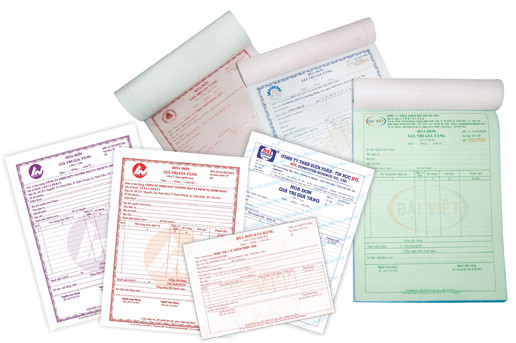Tax authorities will print invoices for businesses.
That is one of the contents drafted by the Ministry of Finance in the draft Decree on invoices (amended), replacing Decree No. 51/2010/ND-CP (Decree 51) dated May 14, 2010 and Decree No. 04/2014/ND-CP (Decree 04) dated January 17, 2014 of the Government, expected to take effect from January 1, 2018.
Illustration photo source Internet. |
According to the Ministry of Finance, in order to expand the use of electronic invoices, it is necessary to limit the number of entities that order and print invoices themselves. In particular, the tax authority will sell invoices to newly established enterprises for a period of 6 months and during this period, the tax authority will support and guide enterprises to switch to using electronic invoices with tax authority codes. For some cases that do not need to buy invoice books but use them infrequently, it is proposed that the tax authority will issue individual invoices printed by the tax authority for use.
To have a basis for drafting the revised Decree, the Ministry of Finance has summarized and assessed the practical implementation of Decree 51 of the Government regulating invoices for the sale of goods and services and the documents amending, supplementing and guiding the implementation of Decree 51 to date.
After nearly 7 years of implementing Decree 51 on invoices and guiding documents, the method of issuing and managing invoices of enterprises has been transformed from the mechanism of "buying invoices from tax authorities" to the mechanism of "enterprises ordering and printing invoices themselves" to use and transform the method of managing invoices (paper) of tax authorities by decentralizing the authority to local Tax Departments to order the printing of invoices for sale to organizations and individuals who are not enterprises but have business activities.
The provisions of Decree 51 have created innovation in granting invoice autonomy to businesses, contributing to administrative procedure reform and enhancing the responsibility of local tax authorities in invoice management.
In addition to the achieved results, Decree 51 on invoices has revealed limitations and shortcomings. Notably, the regulations on printing, issuing and using invoices of Decree 51 applied to paper invoices are no longer suitable for the context of implementing electronic administrative procedures according to Resolution No. 36a/NQ-CP and Directive No. 26/CT-TTg, with the basic content of implementing electronic invoices and documents in 2018 for the entire economy.
Decree 51 has not created adequate legal conditions for the widespread implementation and popularization of electronic invoices in the context of strong development of e-commerce and the 4th industrial revolution. With the widespread use of paper invoices, some subjects take advantage of the openness of the Enterprise Law in the procedures for establishing enterprises to establish many enterprises or acquire enterprises, in fact do not do business but are allowed to use invoices, issue fake invoices, use roundabout invoices to deduct, fake VAT refunds or withdraw payment from the state budget, or do not declare and pay taxes to evade taxes...
Accordingly, the Decree on invoices (amended) will mainly regulate electronic invoices on the basis of inheriting the general regulations on invoices stipulated in Decree 51 but there will be some changes.
The Ministry of Finance proposed that the Government stipulate that the draft Decree takes effect from January 1, 2018 and replaces Decree 51 and Decree 04; at the same time, it proposed that the Government allow the Ministry of Finance to have solutions to support enterprises using invoices printed from computer systems to switch to using e-invoices of enterprises/e-invoices with codes of tax authorities as prescribed in this Decree from January 1, 2018. Invoices that organizations have ordered to be printed before January 1, 2018 will continue to be used in 2018 and the Ministry of Finance will be assigned to have solutions to support enterprises to switch to using e-invoices with authentication codes of tax authorities.
Organizations and businesses operating in the fields of supermarkets and shopping centers use self-printed invoices directly from cash registers and periodically transfer data to tax authorities.
According to Minh Phuong/baotintuc
| RELATED NEWS |
|---|



.jpg)





